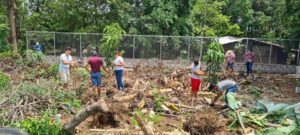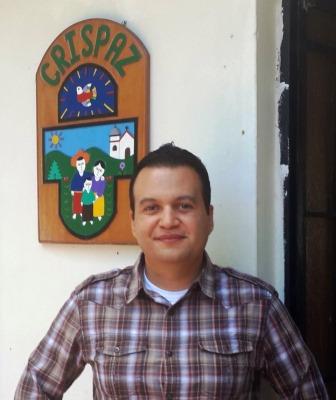
“I don’t focus on the EXistence of God; rather, about the INsistence of God”
Editor’s Note: It is difficult to separate Francisco, the person, from Francisco, the CRISPAZ employee. That is a compliment. Francisco, the employee, is totally immersed in his job of sharing the Salvadoran experience with visiting delegations with honesty and integrity. In fact, it seems as though his position were created with him in mind. He is a fantastic storyteller, as you are about to read. When you meet him in person, you discover that he is able to weave stories about everyone he knows with such a powerful, commanding delivery that you sit spellbound.
Francisco, the person, is fiercely protective of the people with whom he associates. He provides space in his facility for human rights groups to meet who otherwise would have none.
My story cannot be told before first telling about my father, Francisco Mena Sandoval. He was an officer in the Salvadoran army, a career he chose as his life vocation, because to him it stood for helping the people. He was in love with his job. He was not forced to be in the military. My dad was a captain during the 1970’s when he attended the School of the Americas in Fort Benning, Georgia.
[ The U.S. Army School of the Americas (SOA) is a military training institution focused on training Latin American officers – many of whom have been implicated in human rights atrocities, abuses, and torture.]
My dad met reality in El Salvador when he began to notice things going on that didn’t fit with his image and pride of the military. He saw that priests had a love for our country and then heard the army accusing those same priests of communism. Things did not add up based on having been taught what communism was from his training and knowing these same priests personally. It made no sense of the stereotype of communism. He became confused. It was a difficult period for the country and for him personally.
One incident that was especially disingenuous for him was participating in the national presidential election fraud. In 1972 my dad was ordered to participate in this sham by both the mayor and Major Roberto D’Aubuisson under the guise that he was participating as part of his government to defend its people. My dad’s role was to open the doors at the polling location, go in, and change the ballots. [Jose’] Duarte rightfully won the election, but Molina ended up in office due to ballot box tampering.
[Members of ORDEN {paramilitary organization} supervised voting in the outlying provinces and managed to ensure the victory of the PCN’s Col. Arturo Armando Molina. An attempted coup afterward achieved little more than Duarte’s arrest and exile to Venezuela, where he resided until 1979. ]
By the mid-1970’s certain movements going on became more unsettling to my dad; such activities were hard because he wanted to change things from within the confines of the military. In fact my dad personally knew Archbishop Oscar Romero and had conversations with him regarding his confusion about his role in the war. Romero observed, “I can see confusion in you. I don’t think the answer is leaving the country but rather switching armies.” Romero knew the war was inevitable just as God knew the flood was coming for Noah. My dad joined a coupe in 1979 in an effort to make positive change. He was part of a youth coups organizing it.
My dad always felt a passion for the Army and for what they supposedly stood for. He could relate very well with the poor. His family entered extreme poverty when his own father died of diabetes when my dad was seven. Their family lost their home and financial security.
My father became very good friends of Roberto D’Aubuisson. Sadly, this is the same Roberto D’Aubuisson who later became a radical army officer and political leader who is now associated with orchestrating death squads of thousands of innocent Salvadorans, including Archbishop Oscar Romero. My dad knew what this man was capable of doing. In fact, he was right there when D’Aubuisson would openly say that Romero needed to be killed. “They need to kill the dog; this rabies has to be stopped.” It was not hearsay; he heard it firsthand. Dad saw no justification for what was happening around him. He clearly witnessed the injustice.
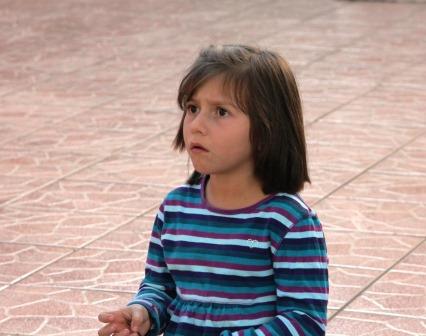
Because of one man who stood above all others, children like this little girl lived.
His breaking point in terms of his career and moral choices came in late 1980. My dad refused to follow an order which involved a massacre of the civilian population in a small community. It was located at Villa del Rosario in the department of Morazan, where people had serious problems to get enough to feed themselves. He was ordered to lead an operation as part of the “Scorch the Earth” movement. But my dad talked to a young boy who approached him telling him about the terrible living conditions for some time and reported that there were no guerrillas in that town. The young man also said there were thousands in that village who were starving and who were fleeing harassment and escaping the army. My dad had a hunch there were no guerrillas as he was told by his superiors. My dad called the intelligence explaining that their information was not correct. There were innocents in the village, not guerrillas. His phone call was stopped abruptly insisting that HE was the one with incorrect information and they hung up on my father. The plan was to send in planes to bomb the town followed by artillery shelling the area; then ground forces of the army were to go in and finish everything left. My dad convinced his soldiers they were not going to follow the orders he was given.
My father ended up changing the orders and led the soldiers into the town without a single shot being fired. All he found were women, elderly, and children, all starving exactly as the boy had described. The church was packed with adults and kids. As he was offering a kid food, the mother slapped the food out of his hand. My dad saw their hatred of the uniform he was wearing, despite their intense hunger.
That was a moment of reckoning for him. He did not carry out the order of the massacre. By disobeying those orders he saved the lives of 4,000 people and all their descendents. It would have been a bigger massacre than the well-documented Massacre of El Mozote. [Over 1,000 innocent villagers of all ages were brutally murdered in this village located within the same department. Read more details in Mark Danner’s book, The Massacre at El Mozote; Chapter 4, “Hammer and Anvil,” has numerous references to Francisco Sandoval’s story.]
My dad also had a social and cordial relationship with the Jesuits who were killed on November 16, 1989. We had pictures of them here at our house at Christmas. He became confused about the context of the country and had questioned the army’s motive and his role. Later in 1980, a group from the National Guard tried to assassinate my dad when he was coming back from Santa Ana because he was outspoken. They shot him in the shoulder. These events and this relationship convinced him that he could no longer be a part of the army.
I was born in San Salvador on July 2, 1974. I have two sisters. As kid, I wore military uniforms too, trying to imitate my dad who initially was that proud career military officer before things turned sour for him. But I can also well remember seeing as a six-year old my dad lying on the couch with a handkerchief on his gunshot- wounded shoulder waiting to go to the hospital. Later my dad had security with him at all times.
He joined the guerrilla resistance forces to fight the injustice he saw around him. 1981 was the last time we saw him as a family until 1989 when he was commissioned to negotiate our country’s peace accords.
Growing up as a child without a father was difficult. A consequence of my dad’s being involved in the guerrilla movement meant that our family led by my mom needed to go into exile in order to be safe. We moved to several countries in Latin America for a couple of years. Then it was on to California in the U.S. in December 1983 until 1989 when we returned to Mexico to be re-united with my dad until 1994 when we as a re-united family all returned to El Salvador.
As an adult I reflect on those many years in exile moving from one Latin American country to another followed by six years in the U.S. I give my capable mother an enormous amount of credit for arranging all the tedious details required in finding safe sanctuary for the three of us kids and herself, negotiating transportation for us, setting us up in our new surroundings including good schools, while monitoring my dad’s dangerous situation in El Salvador, all without provoking our fears.
The goodwill of extended family and other people who helped us during these years in exile was amazing. It must have been a burden to many of them to take on four additional people. In many places we did not have our own apartment; rather, we were in a common apartment with four other families in a similar situation. Two aunts and a grandmother assisted us in the U.S. We lived with an uncle in Mexico. Two years ago when he visited here, I was able to thank that uncle for “grounding” us and providing us with a sense of home during that time. Even though my dad was not with us, my mother provided that sense of home. My mom served as both a mother and father role to us. To this day on Fathers’ Day, we call her up and say, “Happy Fathers’ Day, Mom”.
I have made a transformation in my own thinking as I lived through my dad’s decision to join the resistance to the fighting against the injustice. In Mexico I was upset and angry with my dad for his decision. I was young and immature, and perhaps because I was the only boy in the family, I told him, “I am upset you did that.” In hindsight, I understand why my dad did what he did and needed to make the decisions he made for the greater cause of our country. I now realize his motives were more noble because he put the welfare of the entire country before his immediate family. I can appreciate that it was the right choice for him. The love he has for the people of El Salvador and the level of commitment he has to fight for justice inspired him to act. It makes sense to me now, and I see how truly remarkable a man my dad is. Other people may have just taken their family and left the country, which would have been very selfish. My dad looked beyond his family saying, “My kids are going to be okay, but I have to look out for those who are NOT going to be okay.” I am truly proud of his actions and am guided by his conscience.
I studied first and second grades in Latin America. I was in the U.S. from December of third grade to the middle of ninth grade. Then I was in Mexico, but I graduated in El Salvador and attended the University of Albert Einstein for two years. Later I switched to business administration but also got my teaching certification in English. I taught English in a well known language school in El Salvador and was Academic Coordinator for nine years. I could advance no further there and was offered a job in another English language academy for a year before I heard about my present job at CRISPAZ. (Christians for Peace in El Salvador).
This job seems a perfect fit for me because of the reality I’ve lived. I see it as a calling where I can share my story, which is the story of my country, with others. When I wake up on a Monday morning, I can truly say that I look forward to going to work. My background has helped with the different kinds of audiences I have to address. In reality, I feel I have been preparing for this job since I had to leave the country in 1981. I am very fortunate and very blessed to be part of CRISPAZ and to be able to share the story of El Salvador with the many people through the delegations that visit here. Last year I visited the U.S. to share the story. No words can describe the satisfaction I have in working with a group like CRISPAZ, which is carrying out the memory of the people. One of our strongest references is Monsignor Romero. To be able to share with people and have that connection as a Salvadoran brings a certain proud element to this job. I love what I do. I enjoy interacting with people. I also like pointing out certain things that aren’t very clear that maybe people aren’t paying attention to. We are a faith-based organization. For example, we hear the clichés like “the poor are closest to God.” When I speak to delegations I share with them how when we have a marriage problem, we talk with a marriage counselor. When we have an economic problem, we go to the bank. When we have a health issue, we go to the doctor. However, when the poor have the same issues, they have none of those safety nets, and they go directly to God because they have such a strong relationship with Him. We don’t tend to do that unless our other channels fail us first.
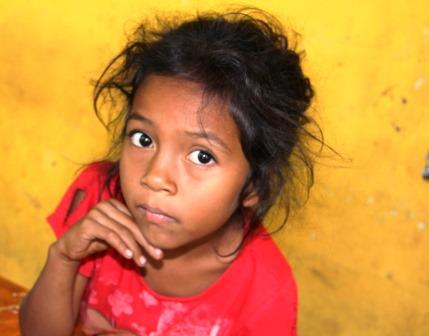
CRISPAZ works hard to give the children of El Salvador a better future.
The Salvadorans tend to have a strong faith. You go out into the campesino communities where the people have been marginalized by society, and they have this remarkable faith and amazing gratitude for the little they have. One sees a connection with God there. It is also important not to romanticize about these conditions and to screen out the poverty. There is nothing cool about being poor. We need to accompany them and build a trusting relationship in order to work on their behalf for a better future for their children and their children’s children.
It is great to be able to share in the story where we not only have lived but also continue to live. I’m Catholic, but for many years I have questioned the formal church. My concern regarding the formal church in a country like El Salvador is that its attention diverts from the real problems happening here. The church pays no attention to the inequality and poverty that exists in El Salvador. I don’t attend weekly Mass because at this point I don’t see that attending services would either facilitate or hinder my faith if I don’t do anything during the week to bring myself into relationship with God. I’m not trying to excuse myself from not attending Mass. It’s just that repeating the same liturgy each Sunday doesn’t seem enough. I believe in God and in the power of God in a more ecumenical way when it comes to faith. I consider the people to be the Church.
The Church’s former view on poverty and inequality was to say it is “God’s will.” Romero spoke out against that saying it is not God’s will. Romero did what he did because he was a man of God and followed the Gospel. He was not motivated because it was the ethical thing to do or the human rights correct thing to do. Some people try to politicize his motivations and actions and try to manipulate history by saying that he saved the country from communism. To believe either of these concepts dishonors his legacy.
I’m discovering my spirituality, my spiritual stirrings. I don’t focus on the EXistence of God; rather, about the INsistence of God. Where and how is He asking me to do my work? How does He make himself present in everything we do? He is always there, but sometimes we don’t pay attention. From where do I draw spiritual energy? Through human connections such as anything related to Romero: his house, the hospital, crypt, at UCA (University of Central America) and its Rose Garden. Also when I visit the site of where the four church women were martyred [December 2, 1980], but more importantly from my people. I recently reflected with a group visiting at that site of how distractions are always in life and we need to pay attention within those distractions and learn to focus. God doesn’t GIVE us things; we need to LOOK for them.
God has put me in appropriate positions to make me focus on certain things and make me be a receptacle and be the eyes for others. I’ve been fortunate to live a normal life. Others are less fortunate. On behalf of those people God has allowed me to listen to their stories and convey them to others in a way beyond the information purposes they could read about. My approach in experiential.
There are two sides of El Salvador. There are nice places which the government likes to focus on, the productive sector, where the power is placed and where projects are developed which is a “bubble.” Outside the “bubble” is the other side of El Salvador in which the vast majority of the people live in shabby huts with corrugated metal roofs and dirt floors; here people have no opportunities. The needs of those who live in abject poverty are too often pushed under the carpet. 60% of the wealth is under control of 7% of Salvadoran people. More people have left the country after the war than during the war. There is no food security. We need to make sure the most vulnerable are NOT vulnerable. Instead of investing other ways to bring funds into the country, we need to keep what is already in the country here. It’s always been a system that has protected and worked well for a very few Salvadorans. It is the lack of opportunities that creates poverty. El Salvador is a very lopsided country. For example, we have plenty of doctors but few clinics and hospitals in which they can practice. The health care system varies and is inconsistent. People in cities have access; people out in the rural communities have nothing available.
I have a love/hate relationship with the U.S. The love part is easy. I love to visit the U.S. I love the Chicago Bears. I’ve been a big fan since I lived there. The first book I read was Brian’s Song, the story of a Bears player, Brian Piccolo, dealing with his cancer, and his relationship with a fellow running back teammate, Gale Sayers. There are certain things I have on my “to do list” when I visit the U.S., such as attend a Chicago Bears game and eat a certain kind of hamburger. I have family in New York. Would I want to live there? No!
The sadder part is what is hidden from the average U.S. citizen which I discover when they come to visit and are shocked and disheartened. Often the U.S. citizens don’t know what is being done in their name. The trade agreements of CAFTA and NAFTA have benefited very few people. For example, I know of a person who was a small businessman making 2000 pair of welding gloves a year employing 3 to 4 other persons and supplying local hardware stores. Literally the day after the CAFTA agreement was signed, he went out of business because he could not compete with the price or volume that other bigger countries could do. He had no capital to invest on a larger scale to compete causing him to go out of business over night. This saddens me. CAFTA has created more of a gap than a bridge to economy in cases like this. The U.S. citizens are often being manipulated in the name of democracy without participation as individuals. I know many people in the U.S., and if they had any personal choice, they would not go along with this. When U.S. investors come to El Salvador, they say things like, “We are here to protect U.S. interests” and “U.S. investments.” I do NOT hear, “We are here to work WITH Salvadorans to improve conditions or economy”.
Sister Peggy O Neill (local Sister of Charity peace activist) has a saying: “Salvadorans have developed night vision”; that is we have learned to live in the darkness. We can’t depend on the government. We can depend only on ourselves. When we see hope and love in the eyes of the people, there are dreams for the country.: One of my biggest job satisfactions can be illustrated by a recent experience I had in taking a delegation to an artisan community. Persons sold their wares to individuals and were grateful for making money with dignity through their work. MY dream is that EVERY Salvadoran have that space for dignity in however they live their lives. Often those living in marginalized areas are excluded from that dream. My job is facilitating that dream and making sure the truth is spoken and that people like Monsignor Romero did not die in vain. History is an important part of my job because it is not only an important part of revisiting the past but also an important part of connecting to the present.
[ Yvonne Dilling writes In Search of Refuge p. 102 “Part of the dignity in these people {Salvadorans} is a reverence for life that comes from understanding their fragile situation; they must live for the moment because tomorrow is guaranteed for no one”].
My dad’s story has given me direction; I have my own identity, and this is important to me. It will be important that my children have their own identity also. They should have their own causes and not depend on anyone else’s. I hope that they not look at the superficial side of things such as increasing their bank account; but look at a job that includes the needs of other people with them.
Both my parents are in good health. They divorced in 1996. We had to pay a price as a family for what happened as a result of the war. My mom is a psychologist and now lives in California.
My dad is in Barcelona, Spain. My father served one term as a senator, but he got frustrated in that role because of the politics and bureaucracy; so he went to Barcelona to study for his masters degree and now the council to El Salvador in Barcelona. Being away from his country is very painful decision for him. He visits here once or twice a year. He was asked, “What are you – a communist, a socialist, a capitalist?” His response: “I’m a Salvadoranist”.
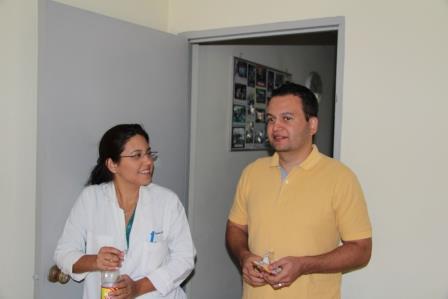
Francisco’s sister who as an MD serves the people of El Salvador
My two sisters also live here in El Salvador; one is a teacher and she is a professional dancer as well. My other sister is a gynecologist and works in two hospitals and has her own practice too.
My wife, Veronica, a trained industrial engineer, has a masters’ from UCA and is now a corporate banker. She believes in social justice also. She and I are thinking of writing to the stork this year.
Because my job is not a typical 9-5 job, the inspiration of my people does not have schedules. I do find myself talking about El Salvador over dinner parties or when out socially having drinks.
To relax and unwind from the intensity of the job, I enjoy spending time with my wife and with friends. I enjoy many genres of music. As a child I grew up listening to my grandfather’s classical music and was blown away when I first attended a live performance of an orchestra. I also love to read and participate in as well as view sports. When I was younger, I participated as a competitive swimmer in the U.S. and Mexico. Breast stroke and butterfly were my events.
I hope that my child grows up in a better El Salvador. It’s not as bad as people portray it, but it can be dangerous. My hope is for kids in general. It’s hard to see that some of them are clearly not going to have a future. They need better choices, better opportunities. My wife and I can provide for our own children and their education. I don’t take that for granted. Others cannot do so.
Regarding what my dad did, despite how hard it was on my family and ended in divorce for my parents, his refusing to carry out the massacre in 1980 saved 4,000 lives and countless offspring. If he had carried it out, our family would have had to live with that, not to mention my dad having it on his conscience. The worst he was called was a traitor, a deserter. Yes, he was a traitor and deserter to the army, but not to the people of El Salvador. I am extremely proud of my dad. It wasn’t easy for him. He went to the military academy to become an officer voluntarily expecting it to be a career for him.
As a family we had a need for closure and returned to El Salvador. There was nothing to prepare me for the emotion I felt when I returned. Literally when the plane landed at the San Salvador airport on my return, I had an emotional meltdown. This is where I knew I needed to be. This is where I choose to live. This is where I want to raise a family. This is where I hope to be buried.
Editor’s Note: When you hear Francisco eloquently reflect on his life situation, you immediately sense the pride he has for those people including his father, who sacrificed mightily on behalf of a more just El Salvador. He is committed to continuing this legacy. May the “stork” bless him and Veronica with many chicks.
If you have been moved by reading Francisco’s story, consider making a tax-deductible donation to:
CRISPAZ
808 Brookhill Rd.
Louisville, KY 40223


